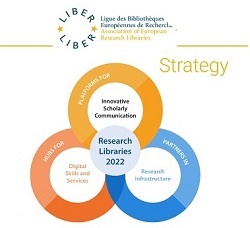Scholarly Communication, Digital Skills & Services and Research Infrastructure : LIBER Strategy (2018-2022)

.jpg)
LIBER’s Vision for the research landscape in 2022 is that the role of research libraries will lie in Powering Sustainable Knowledge in the Digital Age.
To make this happen, LIBER intends to provide the most added value through its three Strategic Directions (2018 - 2022): (1) Innovative Scholarly Communication, (2) Digital Skills & Services and (3) Research Infrastructure and five key enablers. These directions will be three important pillars to achieve (by 2022) a world where:
Open Access is the predominant form of publishing | Research Data is Findable, Accessible, Interoperable and Reusable (FAIR) |
Digital Skills underpin a more open and transparent research life cycle | Research Infrastructure is participatory, tailored and scaled to the needs of the diverse disciplines |
The cultural heritage of tomorrow is built on today’s digital information | |
STRATEGY 1 : Innovative Scholarly Communication
This strategy has four main priorities:
1.) Innovative approaches for Open Access of Research Publications
2.) Research Data Management in light of FAIR Principles
3.) Innovative Metrics to monitor and evaluate research
4.) Innovative Peer Review
These priorities will be supported by three LIBER Working Groups: Copyright & Legal Matters - - Innovative Metrics - - Open Access. |
In this frame, LIBER provides its support to four projects: * OpenAIRE 2020, * HuMetricsHSS, * FOSTER Plus, and *The European Open Science Cloud for Research pilot project (EOSCpilot). |
STRATEGY 2 : Digital Skills & Services
This strategy is governed by the following seven priorities:
1.) Fostering a Service Development Philosophy based on user-centred design
2.) Diversifying Digital Skills of Library Staff Members and Researchers with help of an educational programme
3.) Positioning libraries as a hub for Digital Cultural Heritage and Digital Humanities
4.) Stimulating Citizen Science through outreach and the development of services
5.) Developing library capacity and services to support the uptake of Text and Data Mining
6.) Influencing Copyright and Legal Matters at a policy level
7.) Advocating for developing Information Ethics, in the interests of the research community.
These priorities will be supported by two LIBER Working Groups: Leadership Programmes - - Digital Humanities & Digital Cultural Heritage. |
In this frame, LIBER contributes to two projects: * The European Open Science Cloud for Research pilot project (EOSCpilot) and * OpenMinTed. |
This strategy is orginized around four priorities:
1.) Shared Services and Cloud Services with a solid foundation regarding funding, governance, trust and an evolving technical and social infrastructure
2.) Semantic Interoperability: Open and Linked Data, Metadata and Ontologies, - to engage with other stakeholders to ensure interoperability and accessibility of content
3.) The development of criteria and guidelines regarding Data Stewardship and Data Curation
4.) Scalable infrastructure that should enable cross-disciplinary collaboration.
These priorities will be supported by two LIBER Working Groups: Research Data Management - - Architecture Forum. |
In this frame, LIBER contributes to five projects: * The European Open Science Cloud for Research pilot project (EOSCpilot), * OpenMinTed, * OpenAIRE 2020, * EUDAT, * AARC2. |
The development of the Strategy has been guided by LIBER’s Mission and Values.
Download the Strategy (PDF) or access it online here.
Related:
- Invitation to the INTEREST GROUP in AGRICULTURAL DATA (IGAD) RDA Pre-Meeting P11 (March 19-20, 2018 in Berlin, Germany) dedicated to the theme “The FAIR principles to all elements of the research process in agricultural sciences and related disciplines”
- Call for Papers ! Göttingen-CODATA RDM Symposium (March 19-20, 2018)
- EUDAT Conference entitled “Putting the EOSC vision into practice” (22 - 25 of January 2018, the city of Porto, Portugal)
- LIBER Workshop at IDCC 18 (18-22 February 2018) : How Research Institutions & Libraries can help deliver the European Open Science Cloud - registration is open !
- 3 March 2018 : Open Data Day : You are invited ! Get inspired !
@ Supporting Data Literacy (PDF), a chapter from The Data Librarian’s Handbook by ROBIN RICE and JOHN SOUTHALL, FACET Publishing, Dec 2016 | 192pp
@ Göttingen eResearch Alliance about eResearch related questions and Data Management issues
@ Five Principles for Libraries to use when conducting Open Access negotiations with publishers
@ Implement effective Open Data & Keep it alive with Open Data TOOLKIT
@ Data Sharing : there is no One-Size Fits-All solution ...
@ Open Standards, Data, Source, and Innovation as Principles for Digital Development
@ Technical Recommendations of the COAR Next Generation Repositories Working Group (2017)
@ Funding research data management and related infrastructures
@ Get your free copy of Research Data Management Toolkit !
@ Research Data Management : Training Materials
@ License your Research Data with help of FACT SHEET on CREATIVE COMMONS & OPEN SCIENCE
@ The Realities of Research Data Management : A four-part series that explores how research universities are addressing the challenge of managing research data throughout the research lifecycle (OCLC)
@ METADATA 2020 : towards Metadata as the Scholarly Community’s top priority
@ Make Data Count (MDC) project : Data can receive the same credit that is assigned to Journal Articles
@ Busting Text Data Mining Myths & Misunderstandings
@ FAIR data treatment and training with Dutch Techcenter For Life Sciences
@ Digital Skills and Digital Literacy : European Union policy actions
@ LIBER Webinar: 23 Things About Research Data Management
@ Ask The Chefs: What Is The State Of Innovation In Scholarly Communications Today? (The Scolarly Kitchen)

